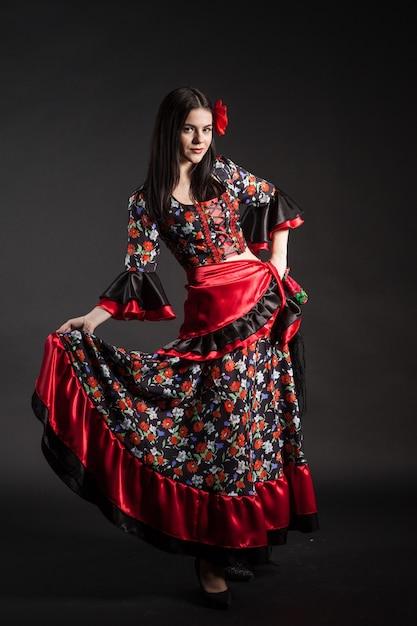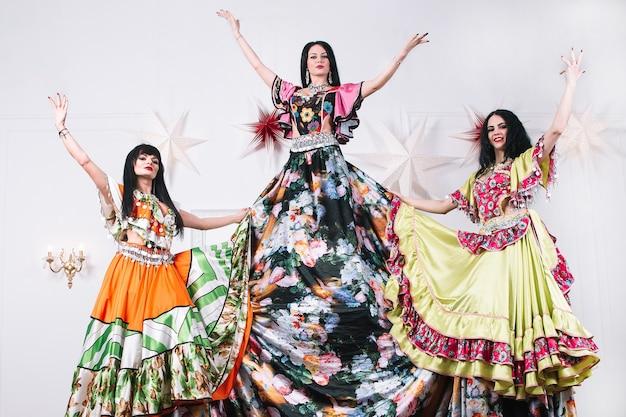Gypsies, also known as Romani people, have a rich cultural heritage with their own language and customs. Over the years, there has been curiosity about what Gypsies call non-Gypsies. This blog post aims to explore the topic and shed light on the various terms used by the Romani community to refer to those who are not a part of their culture.
From the Romani language, terms such as “Gorger” and “Rackley” have been used historically to describe non-Romani people. However, it’s important to note that these terms may not be universally used by all Gypsies, as there are regional variations and individual preferences.
In this blog post, we will delve into the meanings of these terms, explore the distinctions between Gypsies and non-Gypsies, and uncover some intriguing insights into the Gypsy culture. So, let’s embark on this fascinating journey of understanding the terminology used by Gypsies to refer to those outside their community.

What Gypsies Call Non-Gypsies
Have you ever wondered what Gypsies call non-Gypsies? Well, you’re in luck! In this section, we’ll explore the intriguing world of Gypsy culture and shed some light on how they refer to the rest of us.
The Non-Gypsy Nation
Gypsies, also known as Romani people, have a rich and vibrant culture with its own language, customs, and traditions. They are proud of their heritage and often refer to themselves as the “Rom” or “Roma” people. So, what do they call the rest of us? Brace yourself, because here comes the answer that might surprise you – they simply call us the “Gadje”!
Gadje, The Mysterious Others
Gadje, pronounced as “gad-yeah,” is the term Gypsies use to refer to non-Gypsies. It’s not derogatory or offensive; rather, it’s a way to differentiate between their own community and those outside of it. The term “Gadje” encompasses everyone from the non-Romani world, and Gypsies use it casually in their everyday conversations.
The Gadje Life
Being called a Gadje might make you wonder what it’s like to be part of the non-Gypsy world. Let’s take a humorous look at some aspects of the Gadje life and how Gypsies see us:
1. The Busy Bees
Gypsies often perceive Gadjes as constantly busy and rushing around. We have our hectic schedules, deadlines, and endless to-do lists. It’s as if we’re all trying to outrun time itself. But hey, who can blame us when the world moves at such a fast pace?
2. Accidental Comedians
Gadjes are accidental comedians in Gypsy eyes, known for our sometimes clumsiness and ability to find ourselves in hilariously awkward situations. From tripping over our own feet to getting caught in a sudden downpour without an umbrella, the Gadje life is full of unexpected comedic moments.
3. Cursed with Predictability
In the eyes of Gypsies, Gadjes are often seen as creatures of habit who follow predictable routines. Our obsession with schedules and routines amuses them, as they embrace a more flexible and spontaneous approach to life. While it’s true that predictability has its benefits, Gypsies find joy in the unknown.
Embracing the Differences
Although Gypsies refer to non-Gypsies as Gadjes, it’s important to note that this term is not meant to be negative or exclusive. It’s simply a way to differentiate between two distinct communities. In reality, both Gypsies and Gadjes have rich cultures and traditions that deserve appreciation and respect. Embracing our differences can foster understanding, friendship, and a more harmonious coexistence.
So, the next time you come across the term “Gadje,” remember that it’s an endearing way for Gypsies to refer to us, the non-Gypsy folks. Just like a good comedy duo, Gypsies and Gadjes can find humor in the contrasting aspects of their lives and celebrate the diversity that makes our world so fascinating.

FAQ: What Do Gypsies Call Non-Gypsies
As you delve into the vibrant world of Gypsy culture, you may stumble upon the question: What do Gypsies call non-Gypsies? In this FAQ-style subsection, we’ll uncover the intriguing answers to your burning questions and shed light on Gypsy terminology. So, fasten your metaphorical seatbelt and let’s embark on this captivating journey!
Q: What Does “O Beng” Mean in Gypsy
A: Ah, the enigmatic term “O Beng.” In Gypsy language, this phrase is used to refer to someone who is not a Gypsy. While it might sound like a secret code word, it’s actually a friendly way Gypsies use to address non-Gypsies.
Q: What Are Non-Romani People Called
A: Non-Romani folks, also known as “Gorgers,” are individuals who are not a part of the Gypsy community. The term “Gorger” is not meant to offend, but rather to differentiate between Gypsies and those outside their cultural circle. It’s like having your own special nickname for your non-Gypsy pals.
Q: What Is the Difference Between a Gypsy and a Gorger
A: Ah, the eternal question! A Gypsy is someone belonging to the vibrant and diverse Romani people, who have a unique cultural heritage. On the other hand, a Gorger is simply a non-Gypsy, someone who is not a part of the Romani community. So, while both groups share the world together, they travel different paths.
Q: What Is a Male Gypsy Called
A: Prepare to be enlightened by Gypsy linguistics! A male Gypsy is called a “Romanichal.” This term is derived from the Romani language and refers specifically to Gypsy men. So, next time you encounter a Romanichal, give them a nod of recognition for their unique identity.
Q: What Is a “Black Blood” Gypsy
A: Here’s an interesting tidbit: “Black Blood” Gypsy is a colloquial term used to describe individuals who have both Gypsy and non-Gypsy heritage. It symbolizes the blending of different lineages and serves as a reminder of the rich tapestry of cultures that make up the Gypsy community.
Q: What Are Non-Travellers Called
A: When it comes to non-Travellers, they are often referred to as “settled people.” This term differentiates between those who lead a nomadic lifestyle and those who have chosen to settle in one place. So, you could say non-Travellers are just as diverse as the Gypsy community itself.
Q: What Is “Dinlo” Slang For
A: Brace yourself for some delightful slang! “Dinlo” is a playful Gypsy term often used to describe someone who is not the sharpest tool in the shed, if you catch my drift. It’s all in good fun, and every lively language needs a touch of lively slang.
Q: What Is the “DIN” Insult
A: Ah, the infamous “DIN” insult. Derived from Romani, this term is a potent racial slur used against Gypsies. It’s crucial to emphasize that using derogatory language is never acceptable and spreading goodwill is important for coexistence.
Q: What Does “Rackley” Mean
A: Hold onto your hats, folks! “Rackley” is a lesser-known term in Gypsy lingo. This word is used to describe someone who doesn’t quite have their act together or is a bit disheveled. We all have our “rackley” moments, don’t we?
Q: What Is the Gypsy Word for Non-Gypsy
A: In the intricate tapestry of Gypsy vocabulary, the term “Gadje” is employed to refer to non-Gypsies. While it may seem like a word plucked straight out of a fairytale, “Gadje” is simply a way of defining the broader world outside the Gypsy community.
Q: What Does “Tikna Mora” Mean in Gypsy
A: Oh, the beauty of language! “Tikna Mora” translates to “little girl” in Gypsy. It’s a sweet and endearing term to show affection and warmth towards young ones. Spread the love with a sprinkle of Gypsy charm!
Q: What Does “Divya” Mean in Gypsy
A: “Divya” is a delightful Gypsy word that encapsulates beauty and radiance. Translated into English, it means “divine.” So, next time you encounter something truly awe-inspiring, let the word “divya” dance off your lips and celebrate the magic around you.
Q: Are “Peaky Blinders” Irish or Gypsy
A: Picture this: a gripping TV show set in 1920s Birmingham, featuring a notorious gang known as the Peaky Blinders. While their members were predominantly of Irish heritage, the show does pay homage to the unique culture and influence of the Gypsy community within the storyline.
Q: What Are the Two Types of Gypsy
A: Time to unravel the fascinating world of Gypsy diversity! Broadly speaking, there are two main groups of Gypsies: the Romani and the Travellers. Each group has its distinct cultural practices, traditions, and languages, contributing to the vibrant tapestry of Gypsy culture.
Q: What Is a Gorger Person
A: Brace yourself, for within Gypsy terminology lies the term “Gorger.” A Gorger, my friend, is a non-Gypsy individual. While it may sound daunting, it’s simply an easy way to describe someone from outside the Gypsy community. Remember, labels don’t define us; it’s our actions that truly matter.
Q: Where Do “Gypsies” Originally Come From
A: Prepare to be swept away by history! While the origins of the Gypsy people are shrouded in mystery, it is widely believed that their ancestors hailed from the Indian subcontinent. Over centuries, Gypsies embarked on a remarkable journey, spreading across the globe and enriching the cultural mosaic of various nations.
Q: What Is a Black Gypsy
A: “Black Gypsy” is a term sometimes used to describe an individual within the Romani community who has darker skin pigmentation. Diversity is a beautiful thing, and different appearances should always be celebrated.
Q: What Celebrities Are Gypsy
A: The Gypsy community has gifted us with talents that shine bright like the stars! Some notable celebrities with Gypsy heritage include legendary guitarist Django Reinhardt, the electrifying singer Cher, and the captivating actor Michael Caine. Their contributions to the arts have left an indelible mark on our cultural landscape.
Q: What Are Non-Gypsies
A: Broadly speaking, non-Gypsies are individuals who are not a part of the Gypsy community. However, it’s important to remember that just like Gypsies, non-Gypsies come from diverse backgrounds and cultures. Our world thrives on the richness of these differences.
Q: What Does “Kushti Bok” Mean
A: Prepare for a linguistic treat! “Kushti Bok” translates to “good luck” in Gypsy. It’s a phrase sprinkled with positivity, reminding us to embrace the blessings that life has to offer. So, let’s raise our glasses and wish each other a hearty “Kushti Bok!”
Q: What Is the Difference Between a Gypsy and a Traveller
A: The terms “Gypsy” and “Traveller” refer to two distinct groups within the broader Gypsy community. Gypsies, often characterized by Romani heritage, have their unique cultural practices, while Travellers encompass a diverse range of nomadic communities with their own customs and traditions. Together, they form a tapestry of captivating cultures.
Q: What Does “Chav” Mean in Gypsy
A: Ah, the mysterious word “chav.” In Gypsy slang, it refers to a person who indulges in flashy displays of wealth or fashion but lacks refined taste. It’s all about keeping it real and embracing substance over style.
Q: Is “Mush” a Gypsy Word
A: Spot on! “Mush” is indeed a Gypsy word. It’s a term of endearment used to refer to a friend or companion. Allow this charming Gypsy word to roll off your tongue, and spread warmth and friendship wherever you go!
Now that we’ve unraveled the intriguing world of Gypsy terminology, you’re armed with knowledge that reaches far beyond mere words. Remember, true understanding comes from embracing diversity and cherishing the vibrant mosaic of cultures that shape our beautiful world. Kushti Bok, my curious friends!